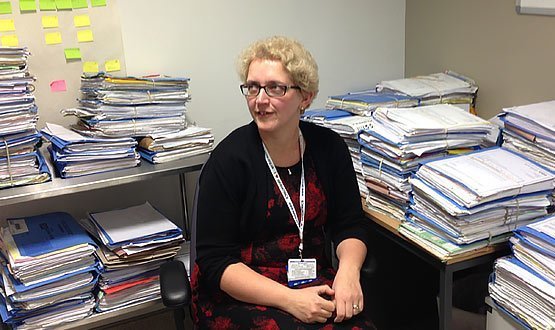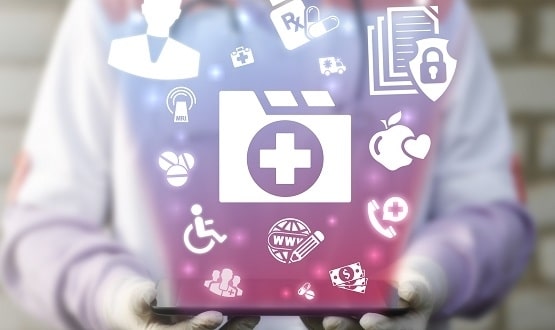The Exchange Factor
- 12 December 2013

“I don’t know how we didn’t have this ten years ago” is a common response from staff at the Royal London Hospital when asked about the new Health Information Exchange.
The HIE is embedded in the trust’s Cerner Millennium electronic patient record system and provides hospital clinicians with an up-to-date summary view of GP information that includes a patient’s problems, diagnoses, recent medications and recent diagnostic tests.
Clinicians say that just one month into the project, being able to view a ‘community record’ is already helping them to make better clinical decisions and reducing the amount of time they spend chasing information or ordering repeat tests.
A&E staff are particularly enthusiastic users of the new system. Working in a paper-free department, they are always using computers to enter information and now have a community record just a click away.
Solving a perennial problem
Emergency medicine consultant Karim Ahmad tells EHI that patient preparation for a visit to his department ranges from getting their full medication list from their GP, to arriving with nothing at all and no idea what they are taking.
“With the vast majority of patients, if you ask for their medical history, they are not that sure,” he says. “With patients who are unable to give any information at all, we are pretty much blind; unless they have been to us before and we have something on our own records.
“Having access to a GP record with more accurate information means that we have got quite clear, precise information about what we are dealing with.”
A common issue in the area that Barts Health serves is patients arriving on the doorstep complaining of “gastric” problems. The most commonly prescribed drugs in the Royal London are paracetamol and ibuprofen; but ibuprofen cannot be prescribed to people with certain gastric issues.
“If you come in saying you have ‘gastric’ we wouldn’t give it to you, but you might have a disorder where that’s actually the best thing to give. Now we can look on the record and can prescribe it,” Ahmad explains.
Ahmad looks at a patient’s ‘community record’ on average three or four times a day and says that will only increase as more records and more data comes online.
He can imagine a “plethora of situations” when being able to view information from the GP could save a patient’s life or significantly change their treatment. Simply being able to see that an unconscious patient is allergic to penicillin makes it a really powerful patient safety tool, he explains.
Record sharing gets lift-off
The HIE project stems from one of the key strategic aims of Barts Health, which is to connect systems up across the whole health economy.
“The real incentive for this is to make sure that wherever a patient is being seen, or a decision being made, all the data from the health economy is presented in that one location, because without it you may make the wrong decision,” the trust’s director of information Luke Readman explains.
It also contributes to another key target, which is to help drive improvements in population health. “If we can create a single virtual system across a health economy, and measure the pathways across the health economy, think of the power to measure and standardise care going forward.
“That’s where we need to take this project in the future. Measurement is key and it relies on data being good,” he adds.
The project kicked off last October by talking to local GPs “because the will to do something is much more important than the ability.”
Informatics programme manager David Bartlett had the sometimes tricky task of getting all the data sharing agreements signed between Barts Health and individual GP practices. He says that while it was a lot of work, this can now be replicated for use within other clinical commissioning group areas.
Key features are that only coded data is used and there are certain exemptions, such as sexual health status and other sensitive information. The HIE is also only available via Millennium, which is accessed using smartcards.
“The agreement had to be quite clear on the governance put in place around security of the information and permission given by the patient for viewing of the record,” he explains.
With GPs on board with the idea, it seemed sensible to use the technology developed by Cerner for the US market – the HIE – and connect that with Healthcare Gateway’s Medical Interoperability Gateway, which already has data sharing agreements with all the major GP IT suppliers in the UK.
This left just the technical question of, “can we connect the MIG and HIE together?” Fortunately, the answer was “yes” and about a year on, the project was delivered in pilot form.
Realising its potential
Consultant geriatrician Claire Dow does acute on-call work in the weekends and finds the HIE particularly useful when dealing with elderly patients who are very confused and do not have their medications.
Recently, a patient like this was brought in and Dow could see from the EPR that she had not been to hospital for five or six years. This meant she was not sure if the confusion was new or a diagnosed problem, which would change her treatment.
With the patient’s permission, she was able to see on her community record that there was no mention of dementia and act accordingly.“If she was known to have dementia I would have changed the testing protocols,” she explains.
“It’s still early days, but this will reduce repetition of tests we are doing and save trainees’ time, because if we don’t have the information they have to ring the GP practice and ask for a summary.
“If they’re not having to make those phone calls to GPs that time can be used talking to patients and relatives and that will improve the quality of care for patients on the wards.”
Dow believes the biggest impact for patients is about medicines reconciliation. “Especially for older people as we can see straight away what the patient has been prescribed so we can amend their meds immediately if necessary,” she says.
“Previously this could add time on to a patient’s length of stay while chasing information and hospitals aren’t the safest place to be at times.”
Dow says the new system also has significant potential for breaking down barriers between GPs and other community clinicians and the hospital teams.
A CCIO’s view
Clinical information officer at Barts Health, David Van Heel, echoes many people’s opinions when he describes the HIE portal as “fantastic”.
He checks the community record of everybody he sees in clinic. “Not all patients will have it, but for local patients it’s fantastic.”
He can see if the patient has been sent for any recent tests, which has already stopped him ordering new tests at the hospital on a number of occasions.
Van Heel says he is doing something different in terms of his treatment, prescriptions or ordering of tests in around one in ten cases after viewing the community record.
“It’s just a useful check that the GP has got the right end of the stick. It’s an instant communication aid without having to pick up the phone and try get through to a receptionist.”
Pharmacists find the system invaluable for medicines reconciliation as they can see what a GP has prescribed to patients without having to go through the laborious process of ringing the practice or sending a fax requesting the information.
“For outpatients its had a moderate impact, but for other specialities, in A&E and in elderly care and pharmacy it’s of huge impact,” he says.
“Patients like it. They can’t understand how we didn’t have it before, as they presumed we communicated with the GP all the time. So it’s reassuring for patients that communication is happening.”
Van Heel concludes our interview with the now familiar refrain: “We should have had this ten years ago”.
Listen to the latest EHI Podcast, which includes interviews with Barts Health staff about the new system.




